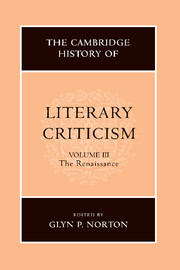Book contents
- Frontmatter
- Introduction
- READING AND INTERPRETATION: AN EMERGING DISCOURSE OF POETICS
- POETICS
- THEORIES OF PROSE FICTION
- CONTEXTS OF CRITICISM: METROPOLITAN CULTURE AND SOCIO-LITERARY ENVIRONMENTS
- VOICES OF DISSENT
- STRUCTURES OF THOUGHT
- NEOCLASSICAL ISSUES: BEAUTY, JUDGEMENT, PERSUASION, POLEMICS
- 51 Combative criticism: Jonson, Milton, and classical literary criticism in England
- 52 The rhetorical ideal in France
- 53 Cartesian aesthetics
- 54 Principles of judgement: probability, decorum, taste, and the je ne sais quoi
- 55 Longinus and the Sublime
- A SURVEY OF NATIONAL DEVELOPMENTS
- Bibliography
- Index
- References
54 - Principles of judgement: probability, decorum, taste, and the je ne sais quoi
from NEOCLASSICAL ISSUES: BEAUTY, JUDGEMENT, PERSUASION, POLEMICS
Published online by Cambridge University Press: 28 March 2008
- Frontmatter
- Introduction
- READING AND INTERPRETATION: AN EMERGING DISCOURSE OF POETICS
- POETICS
- THEORIES OF PROSE FICTION
- CONTEXTS OF CRITICISM: METROPOLITAN CULTURE AND SOCIO-LITERARY ENVIRONMENTS
- VOICES OF DISSENT
- STRUCTURES OF THOUGHT
- NEOCLASSICAL ISSUES: BEAUTY, JUDGEMENT, PERSUASION, POLEMICS
- 51 Combative criticism: Jonson, Milton, and classical literary criticism in England
- 52 The rhetorical ideal in France
- 53 Cartesian aesthetics
- 54 Principles of judgement: probability, decorum, taste, and the je ne sais quoi
- 55 Longinus and the Sublime
- A SURVEY OF NATIONAL DEVELOPMENTS
- Bibliography
- Index
- References
Summary
The notion of vraisemblance [probability], which is in some sense the keystone of French neoclassical poetics, has both a technical content, indicating to the poet how to secure the audience's engagement with the text, and a more ideological content, referring to the social and moral ideas in virtue of which the work will be judged. It is the latter sense that is dealt with here.
The link between the notion of vraisemblance, as a criterion of artistic validity, and ethical judgements appears in Georges de Scudéry's statement, apropos of Corneille's Le Cid, that, although the historical original of Chimène did in fact marry the Cid, ‘it is not probable that an honourable maiden should marry her father's murderer’. He is here using the term ‘vraisemblable’ to denote the realm of general truth (as distinct from particular historical truth), which Aristotle identifies as the object of poetry. The Académie Française agreed with this: the poet's task is to purify his material of the dross of historical contingency, in keeping with ‘the universal idea of things’: he is to consider what is proper for a young woman in general rather than what Chimène actually did, and because her behaviour belies ‘the moral propriety [‘la bienséance des moeurs’] of a young woman presented at first as virtuous’, it offends vraisemblance. (This looks like an accusation of inconsistency rather than impropriety. But the Académie's term for inconsistency is ‘inégalité’.) In other words, the question, for these critics, is not whether Corneille has made Chimène's behaviour credible: it is intrinsically incredible.
- Type
- Chapter
- Information
- The Cambridge History of Literary Criticism , pp. 522 - 528Publisher: Cambridge University PressPrint publication year: 1999
References
- 1
- Cited by

